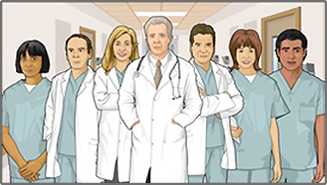Eating extra calories when sick - adults
If you are sick or undergoing cancer treatment, you may not feel like eating. But it is important to get enough protein and calories so you do not lose too much weight. Eating well can help you handle your illness and the side effects of treatment better.
Self-care
Change your eating habits to get more calories.
- Eat when you are hungry, not just at mealtimes.
- Eat 5 or 6 small meals a day instead of 3 large ones.
- Keep healthy snacks handy.
- Don't fill up on liquids before or during your meals.
- Ask your health care provider if you can sometimes have a glass of wine or beer with one of your meals. It may make you feel like eating more.
Ask others to prepare food for you. You may feel like eating, but you might not have enough energy to cook.
Make eating pleasant.
- Use soft lighting and play relaxing music.
- Eat with family or friends.
- Listen to the radio.
- Try new recipes or new foods.
When you feel up to it, make some simple meals and freeze them to eat later. Ask your provider about "Meals on Wheels" or other programs that bring food to your house.
Ways to add Calories to Your Food
If your provider says it's OK, you can add calories to your food by doing the following:
- Add butter or margarine to foods when you are cooking, or put them on foods that are already cooked.
- Add cream sauce or melt cheese over vegetables.
- Eat peanut butter sandwiches, or put peanut butter on vegetables or fruits, such as carrots or apples.
- Mix whole milk or half-and-half with canned soups.
- Add protein supplements to yogurt, milkshakes, fruit smoothies, or pudding.
- Drink milkshakes between meals.
- Add honey to juices.
Ask your provider about liquid nutrition drinks.
Also ask your provider about any medicines that can stimulate your appetite to help you eat.
Reviewed By
Todd Gersten, MD, Hematology/Oncology, Florida Cancer Specialists & Research Institute, Wellington, FL. Review provided by VeriMed Healthcare Network. Also reviewed by David C. Dugdale, MD, Medical Director, Brenda Conaway, Editorial Director, and the A.D.A.M. Editorial team.
National Cancer Institute website. Nutrition in cancer care (PDQ) - health professional version. www.cancer.gov/about-cancer/treatment/side-effects/appetite-loss/nutrition-hp-pdq. Updated May 16, 2024. Accessed May 28, 2024.
Thompson KL, Elliott L, Fuchs-Tarlovsky V, Levin RM, Voss AC, Piemonte T. Oncology evidence-based nutrition practice guideline for adults. J Acad Nutr Diet. 2017;117(2):297-310. PMID: 27436529 pubmed.ncbi.nlm.nih.gov/27436529/.
Disclaimer
© 1997- A.D.A.M., a business unit of Ebix, Inc. Any duplication or distribution of the information contained herein is strictly prohibited.



